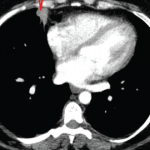In a systematic literature review, researchers found that rheumatoid arthritis patients taking etanercept were less likely to discontinue their treatment than patients using any of five other tumor necrosis factor inhibitors…


In a systematic literature review, researchers found that rheumatoid arthritis patients taking etanercept were less likely to discontinue their treatment than patients using any of five other tumor necrosis factor inhibitors…

Patients with axial spondyloarthritis have a chronic, immune-mediated inflammatory disease that tends to localize to the sacroiliac joints and spine. Ankylosing spondylitis is, perhaps, the most representative of this group of diseases. Rheumatologists treat patients with axial spondyloarthritis with biologics, such as tumor necrosis factor inhibitors (TNFi’s), which can improve quality of life, activity and…

SNOWMASS VILLAGE, COLO.—Even in the era of treat to target, cardiovascular disease risk remains elevated and is a major source of mortality and morbidity in patients with rheumatoid arthritis (RA). Screening and management of cardiovascular risk in these patients is critical to ensure these patients are identified and treated. At the 2019 ACR Winter Rheumatology…

Currently, treatment options for patients with peripheral spondyloarthritis, which includes psoriatic arthritis and non-psoriatic types, are limited. Philippe Carron, MD, Department of Rheumatology, Ghent University Hospital, Belgium, says, “One of the problems we encounter in the daily management of peripheral spondyloarthritis is that we have no other therapeutic options in patients refractory to NSAIDs [non-steroidal…
Megan Brooks |
NEW YORK (Reuters Health)—A large epidemiological study provides more evidence of a link between tumor necrosis factor inhibitors (TNFi) and peripheral neuropathy (PN). “These events are rare and the benefit of these drugs still outweigh this risk so this should not change practice,” cautions first author Dr. Mahyar Etminan from the University of British Columbia…
Vinet et al. evaluated the risk of serious infections in children of women with RA exposed to TNFi’s in the gestational period compared with unexposed offspring of women with RA, as well as with children from the general population. Although the research did not demonstrate a marked excess risk for serious infections, the authors could not exclude a differential risk according to specific TNFi, with infliximab potentially resulting in a threefold increase in the risk of serious infections compared with other TNFi’s. More studies are needed…
Will Boggs, MD |
NEW YORK (Reuters Health)—Tumor necrosis factor (TNF) inhibitors do not appear to increase cancer-recurrence rates in patients with rheumatoid arthritis (RA), according to new findings from Sweden. TNF has both tumor-promoting and cancer-protective effects, so TNF inhibitors could conceivably affect the risk for cancer recurrence. However, few studies have reported the risk for cancer relapse…

Sunita Paudyal, MD, & Laura B. Herpel, MD |
Click here for the case. Discussion Image 1 demonstrates two nodules in the right lung, one over the lateral costophrenic sulcus (2.4 x1.7 cm, not shown); and another in the middle lobe (3.1 x 2.6 cm), with lobulated and spiculated margins (red arrow). There was no lymphadenopathy or pleural effusion. Of note, a normal chest…

Sunita Paudyal, MD, & Laura B. Herpel, MD |
Editor’s note: In this occasional feature, we first present a series of images (this page) for your review, and then a brief discussion of the findings and diagnosis. Before you read the discussion, examine these images carefully and draw your own conclusions. History A 39-year-old white woman with a three-year history of seropositive rheumatoid arthritis…

A recent study examined the level of anti-drug antibodies (ADAs) in RA patients taking the TNF inhibitors adalimumab, infliximab and etanercept. Study patients without ADAs experienced better clinical outcomes, while patients with detectable ADAs had significantly lower serum trough drug concentrations…